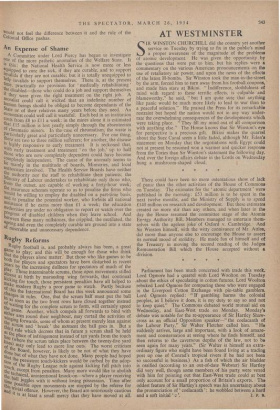R ugby Reforms ugby football is, and probably always has been,
a great firRle to play; and this will be enough for those who think Ya the players alone matter. But those who like games to be b al eah for players and spectators have been disturbed in recent rs by the increasing dullness for spectators of much of the fl),aY• Those interminable scrums, those open movements stifled almost at birth by marauding wing forwards, that continual 7"eking for touch, those persistent penalties have all helped to Mat, r, modern Rugby a poor game to watch. Partly because this the International Board has this week announced some to changes in rules. One, that the scrum half must put the ball of as soon as the two front rows have closed together instead th„'vaiting for the complete scrum to form, will certainly speed Another, which compels all forwards to bind with 1,vi„sl. arm. round their neighbour, may curtail the activities of th:gmg forwards, some of whom at present merely lean against th:- serum and break' the moment the ball goes in. But a linethe rule which decrees that in future a scrum shall be held Place of infringement instead 'of ten yards from the touch hne (where the scrum takes place between the twenty-five yard of e,s2 may only lead to more line outs. The worst criticism do„'"e Board, however, is likely to be not of what they have ttha"te,,hut of what they have not done. Many people had hoped ot the persistent touch-kickers would be curbed by the adop- tonne,of the Rugby League rule against kicking full pitch into the to ]tcept from penalties. Many more would like to abolish .ecnnical; unintentional knock-on—where a player receiving juggles with it without losing possession. Time after or Possible open movements are stopped by the referee for ands tral offence. However, the Board are notoriously cautious 1 is at least a small mercy that they have moved at all.










































 Previous page
Previous page